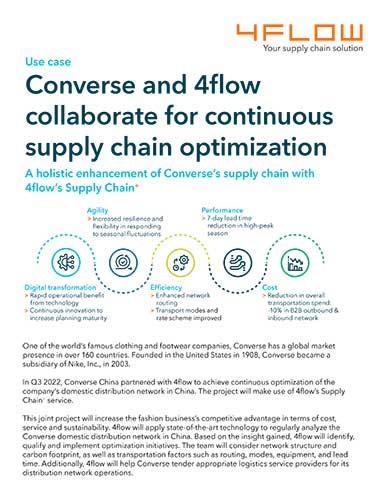A Quantum Leap in Logistics - How Quantum Computing Will Unlock New Supply Chain Optimization Capabilities

An interview with Wendelin Gross, head of 4flow research, about the research project ProvideQ and how quantum computing will unlock new optimization capabilities in the supply chain and logistics.
How Quantum Computing Will Unlock New Supply Chain & Logistics Optimization Capabilities
What Is Quantum Computing and What’s The Connection to the Supply Chain?
While classical computers use bits (which are either 0 or 1) to perform computations, a quantum computer has qubits that can be both 0 and 1 with certain probabilities. Quantum computers exploit physical attributes of these qubits – such as superposition, interference, and entanglement – that exceed the computational mechanisms of classical computers. With this extra power, programmers will be able to write specific code that a classical computer could not run or interpret.
Supply chain optimization problems are known for having a multitude of variables and parameters, like delivery time windows or shipping requirements like refrigeration in transportation planning. Classical computers are already at their limits when trying to solve these problems. Researchers expect quantum computers to work with classical computers by handling the most difficult challenges and leaving the rest to classical ones.
How Is 4flow Involved in Quantum Computing for the Supply Chain?
4flow Research, our supply chain innovation lab, is a partner in the project ProvideQ. This three-year-long research project takes the abstract theory behind quantum computing and finds opportunities for future quantum computers to efficiently solve logistics problems.
In the project, 4flow provides the necessary practical knowledge of logistics problems, data, and computational heuristics to develop quantum-based algorithms. We also help identify which logistics problems are suitable for a “quantum upgrade” – one of the key challenges of this project.
What Are Some Use Cases You’re Researching?
We are researching three specific quantum computing use cases relevant to logistics: load building, vehicle routing, and production planning. In all these use cases, finding optimal solution scenarios with a classical computer in a reasonable amount of time requires huge simplifications of the problem.
These simplifications, either in the form of approximation algorithms or heuristic methods of computing, have drawbacks. Approximation algorithms cannot handle large quantities of variables, and heuristic methods diminish the real-world accuracy of the problem at hand.
What Is the Benefit of Using Quantum Computing for These Kinds of Problems?
In the future, once quantum computers are available, they will allow supply chain planners to consider many more real-world constraints for these logistics use cases and produce more accurate results, because they can efficiently handle many more parameters than classical computers.
For example, center-of-gravity constraints in container loading: quantum computing can integrate factors like weight distribution, horizontal and vertical stability, and stacking constraints to find an optimal way of loading a truck or container. This will in turn reduce costs and carbon emissions by improving asset utilization.
You Mentioned ProvideQ Is Working with Theory to Identify Uses for Future Quantum Computers. What Is the Current State of Quantum Computing Research, and Quantum Computers?
The theory is far ahead of the hardware. The theoretical side of quantum computing has been steadily developing since the 1980s and setting the course for the capabilities of future technology.
Until very recently, the hardware has been unavailable to potential buyers and scientists, and even now, its abilities are limited. Researchers have given quantum computers logistics problems to solve, but the computers themselves are not yet powerful enough to tackle real-world problems. For example, most current quantum computers can only solve the Traveling Salesman Problem for a few nodes, about 6-10.
Funding for research into developing quantum hardware at the scale needed to make large gains has increased significantly. We are already seeing significant hardware advances in short periods.
We’re optimistic the hardware will advance enough to see business applications already in the next five to ten years.
Thanks very much, Wendelin, we’re excited to see the results of the ProvideQ project and applications for quantum computing in supply chain and logistics.
Project ProvideQ
In the project ProvideQ, 4flow research is working with partners Leibniz University Hannover, the University of Cologne, the Technical University Braunschweig, Johannes Kepler University Linz, the Karlsruhe Institute of Technology and GAMS Software. The project began in January of 2022 and will run until the end of 2024.
4flow Research is our supply chain innovation lab. The team performs research and publishes studies on supply chain topics including data science and data ecosystems, resilient and robust supply chains, optimization algorithms, and sustainability and decarbonization.
About the Author
Wendelin Gross is the Head of 4flow's Research.












